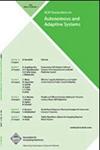Dynamically Balancing Load with Overload Control for Microservices
IF 2.2
4区 计算机科学
Q3 COMPUTER SCIENCE, ARTIFICIAL INTELLIGENCE
引用次数: 0
Abstract
The microservices architecture simplifies application development by breaking monolithic applications into manageable microservices. However, this distributed microservice “service mesh” leads to new challenges due to the more complex application topology. Particularly, each service component scales up and down independently creating load imbalance problems on shared backend services accessed by multiple components. Traditional load balancing algorithms do not port over well to a distributed microservice architecture where load balancers are deployed client-side. In this paper, we propose a self-managing load balancing system, BLOC, which provides consistent response times to users without using a centralized metadata store or explicit messaging between nodes. BLOC uses overload control approaches to provide feedback to the load balancers. We show that this performs significantly better in solving the incast problem in microservice architectures. A critical component of BLOC is the dynamic capacity estimation algorithm. We show that a well-tuned capacity estimate can outperform even Join-the-Shortest-Queue, a nearly optimal algorithm, while a reasonable dynamic estimate still outperforms Least Connection, a distributed implementation of Join-the-Shortest-Queue. Evaluating this framework, we found that BLOC improves the response time distribution range, between the 10th and 90th percentiles, by 2 to 4 times and the tail, 99th percentile, latency by 2 times.利用微服务的过载控制动态平衡负载
微服务架构将单体应用程序分解为可管理的微服务,从而简化了应用程序的开发。然而,由于应用程序拓扑结构更为复杂,这种分布式微服务 "服务网 "带来了新的挑战。特别是,每个服务组件都会独立地向上和向下扩展,从而在多个组件访问的共享后端服务上造成负载不平衡问题。传统的负载平衡算法不能很好地移植到分布式微服务架构中,在这种架构中,负载平衡器部署在客户端。在本文中,我们提出了一种自管理负载平衡系统 BLOC,它无需使用集中式元数据存储或节点间的显式消息传递,就能为用户提供一致的响应时间。BLOC 使用过载控制方法向负载平衡器提供反馈。我们的研究表明,这种方法在解决微服务架构中的incast问题方面有明显的优势。BLOC 的一个关键组成部分是动态容量估算算法。我们的研究表明,经过良好调整的容量估计甚至可以优于Join-the-Shortest-Queue(一种近乎最优的算法),而合理的动态估计仍然优于Least Connection(一种Join-the-Shortest-Queue的分布式实现)。在对这一框架进行评估时,我们发现 BLOC 可将响应时间分布范围(第 10 个百分位数和第 90 个百分位数之间)提高 2 到 4 倍,将尾部(第 99 个百分位数)的延迟时间提高 2 倍。
本文章由计算机程序翻译,如有差异,请以英文原文为准。
求助全文
约1分钟内获得全文
求助全文
来源期刊

ACM Transactions on Autonomous and Adaptive Systems
工程技术-计算机:理论方法
CiteScore
4.80
自引率
7.40%
发文量
9
审稿时长
>12 weeks
期刊介绍:
TAAS addresses research on autonomous and adaptive systems being undertaken by an increasingly interdisciplinary research community -- and provides a common platform under which this work can be published and disseminated. TAAS encourages contributions aimed at supporting the understanding, development, and control of such systems and of their behaviors.
TAAS addresses research on autonomous and adaptive systems being undertaken by an increasingly interdisciplinary research community - and provides a common platform under which this work can be published and disseminated. TAAS encourages contributions aimed at supporting the understanding, development, and control of such systems and of their behaviors. Contributions are expected to be based on sound and innovative theoretical models, algorithms, engineering and programming techniques, infrastructures and systems, or technological and application experiences.
 求助内容:
求助内容: 应助结果提醒方式:
应助结果提醒方式:


